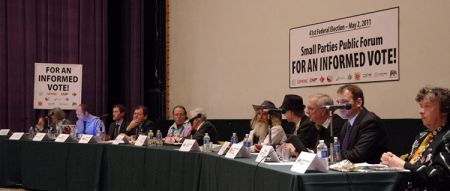The Foundation for Democratic Advancement (FDA), a Calgary-based organization that describes its mission as advancing "fair and transparent democratic processes wherever elections occur" and providing "fundamental support for people's democracies defined as government of, for and by the people," has given Canada an overall score of 25.75 per cent in electoral fairness in its 2011 Federal Election Audit.
In a press advisory, the FDA highlights the results of its study, which examined electoral coverage in the media, election financing laws and regulations over electoral broadcasting.
The press release states:
"- Canada scored lower in electoral spending than the Tunisian dictatorship under Ben Ali
- Canada scored only 23 per cent for equality of political content from the media;
- study shows that freedom of expression is restricted by finance laws that favour dominant parties;
- study shows that there is severe inequality in the media and favouring of parties that were previously successful;
- Canada's only passing grade of 60 per cent is in equality of voter say."
In its concluding remarks, the FDA's 2011 Audit states:
"In consideration of the research and findings, the source of the electoral unfairness is severe inequality in the media and severe favouring of candidates who were successful in the previous election. The success in the previous election and control of the media are mutually reinforcing forces. It should be noted that in principal, a person who wins for example a marathon, is not given a significant head start in the next marathon simply because he won the previous race. He starts at the same place as other competitors. In Canada's electoral system, candidates and parties successful in the previous election are given inexplicably a very significant head start or advantage in the next election and throughout the election process in general."
The FDA concludes that the problem "stems likely from the fact that the majority of the Parliament determines the election rules, and the majority of Canada's parliamentarians have the support of Canada's mainstream media and broadcasters. Basically and inexplicably, the majority of Canada's federal politicians are making the rules of their own game. It is a self-perpetuating system favouring particular political parties who have the support of the mainstream media, in a never ending cycle of electoral unfairness."
The FDA recommends that:
"1. The majority of federal politicians cease to determine the federal election laws.
"2. An independent, non-partisan citizen-based committee made up of the diverse regions of Canada determine the federal election laws, and which must be consistent with the Canadian Constitution and Canadian Charter of Rights and Freedoms.
"3. The Canadian mainstream media and broadcasters three months prior to an election period and during it, are required to present an equality of non-partisan political content of all registered political parties.
"4. No registered political party is given an unequal advantage prior to and during an election. All registered political parties begin an election from the same starting place in terms of finances and media access, and throughout the campaign."



